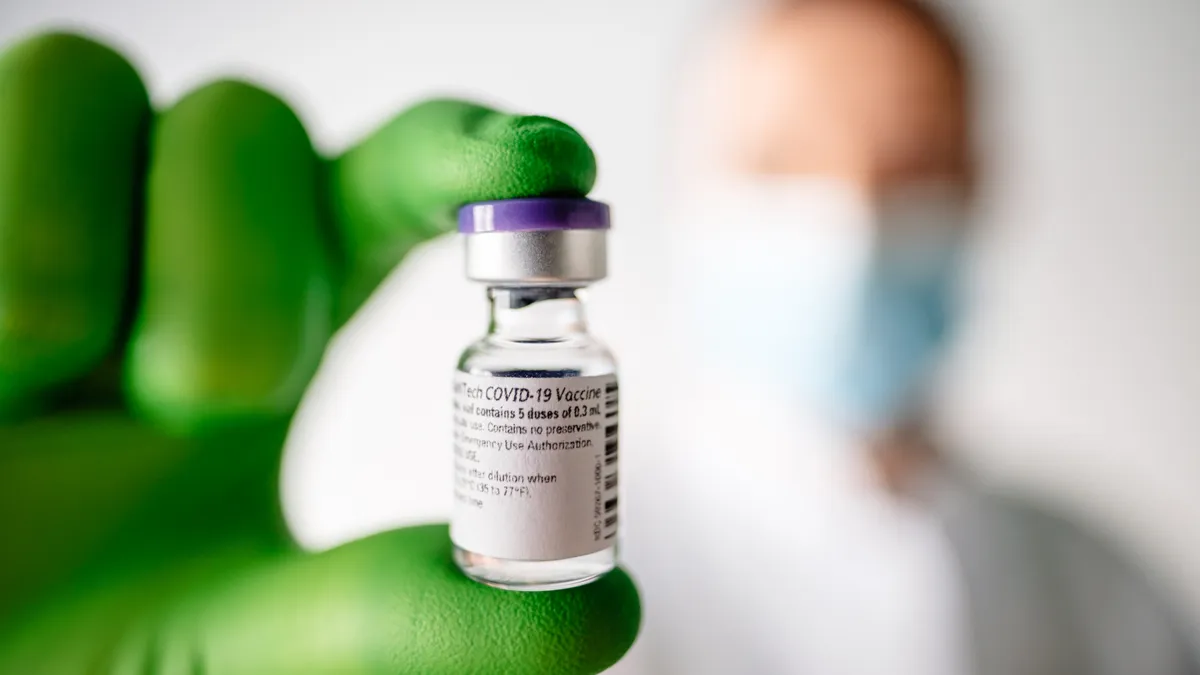The Food and Drug Administration approved the emergency use of Pfizer and BioNTech's coronavirus vaccine Friday, clearing the way for the nationwide distribution of the first nontrial vaccine doses, which began arriving at hospitals Monday.
Per the recommendation of the Advisory Committee on Immunization Practices (ACIP), an independent group convened by the Centers for Disease Control and Prevention (CDC), healthcare workers and residents of long-term care facilities will be the first recipients as part of Phase 1a.
Banking trade group the American Bankers Association (ABA) is calling for front-line bank employees to be included in the second tranche, Phase 1b, which includes essential workers.
"[A]mong bank employees already deemed 'essential' by the government, those that come in contact with the public every day, such as tellers, should be considered for the CDC's Phase 1b along with essential workers in other industries," an ABA spokesperson said Monday.
The ABA, which said it has been working with public health agencies since the start of the pandemic, wrote to the CDC on Thursday, reiterating its stance that front-line bank workers should be considered for inclusion in the Phase 1b.
In his letter to the CDC, Paul Benda, the ABA's senior vice president of risk and cybersecurity policy, cited Department of Homeland Security guidance that designates a range of bank workers "essential" given their unique roles in support of the economy and their local communities.
"This important designation allows them to conduct their work and travel as needed when states and localities impose pandemic-related restrictions," Benda wrote. "We deeply appreciate that the CDC’s ACIP has already recommended that ‘essential’ personnel from a range of industries including banking be included in the vaccination distribution Phase 1B sequence after healthcare workers and longterm care residents."
Benda said the ABA believes front-line bank workers who come into contact with customers, such as tellers and loan officers, face the highest risk of infection and pose the greatest risk of spreading the virus if infected.
"[T]hese frontline workers … are absolutely essential, especially in communities where residents may not have access to electronic banking tools," Benda wrote.
Each state will ultimately determine its own vaccine distribution sequencing. However, Benda said, the CDC’s recommendations will likely serve as a guide in those decisions.
The CDC is expected this week to release vaccine distribution guidance to state and local health leaders.
The ABA is not the only industry trade group calling for its front-line workers to be included in the second vaccination group. The National Retail Federation (NRF) and the National Restaurant Association have also argued their front-line workers should receive the vaccine after healthcare workers and other first responders, according to The Hill.
"Groceries are also critical, so those workers should also be near the top of the list," David French, NRF senior vice president for government relations, told the publication.
Since banks have been considered essential businesses throughout the pandemic and haven’t been ordered to close branches, many have been handling transactions through their drive-through windows or allowing customers into branches by appointment only. Like other businesses still operating amid the pandemic, many bank branches have cut hours and reduced office-based staff for safety reasons.
Banks have also implemented employee temperature checks and rotating shifts to prevent overpopulating an office.
Amid the drastic changes in operations, many banks have reported spikes in the usage of their digital offerings as more customers turn to mobile and online channels to conduct transactions.
"It's clear that this [pandemic] has shocked the behavior of clients and bank employees to become more fluid with digital technology," Joe Thomas, CEO of Fairfax, Virginia-based Freedom Bank, told Banking Dive in May. "I think we will see more and more clients rely solely on the relationship using digital channels."














